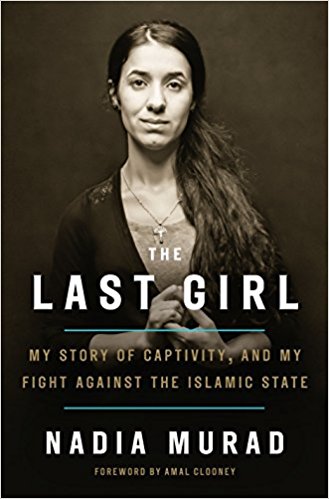
Rape is a horrific weapon of ancient and modern warfare. When countenanced by leaders of armed forces, it is a tool that brutalizes, demoralizes, and subjugates occupied peoples, leaving them hopeless and despairing, unable to resist. Those who survive the savagery bear wounds that never heal. Few survivors have either the desire to recount their experiences or the ability to voice articulately the cries of their fellow victims – which is why Nadia Murad’s The Last Girl: My Story of Captivity, and My Fight Against the Islamic State is so valuable.
One of the million or so adherents of the Yazidi faith, Murad was born in 1999 in the remote northern Iraq village of Kocho. Although their safety was always precarious, the Yazidis were left alone by Saddam Hussein and his Baathist party to practice their faith and live out their lives. That peace came to an end with the American invasion in 2003 and the civil conflict that followed. Murad observes that while most Yazidis welcomed the Americans, they were skeptical that regime change would lead to a better quality of life, a skepticism that proved justified as Sunni insurgency gained momentum.
Reflecting on Yazidi culture, Murad observes: “We treat happiness like a thief we have to guard against, knowing how easily it could wipe away the memory of our loved ones or leave us exposed in a moment of joy when we should be sad, so we limit our distractions.”
Catastrophe came in 2014 when Kocho fell to ISIS. Most of the its men were killed, and its women sold into slavery. Her abuse at the hands of ISIS and harrowing escape to Iraqi Kurdistan offers a portrait of courage, perseverance in the face of evil, and a tenacious desire to see ISIS put on trial for genocide. The unexpected aid of a Sunni family reminds that human compassion can flourish where least expected.
Murad describes feelingly the plight of many refugees:
I still think that being forced to leave your home out of fear is one of he worst injustices a human being can face. Everything you love is stolen, and you risk your life to live in a place that means nothing to you and where, because you come from a country now known for war and terrorism, you are not really wanted. So you spend the rest of your years longing for what you left behind while praying not to be deported.
I want to listen to representative voices of suffering people. Nadia Murad’s story is compelling. Sadly, her heart’s desire will go unmet: “More than anything else,” she writes, “I want to be the last girl in the world with a story like mine.”